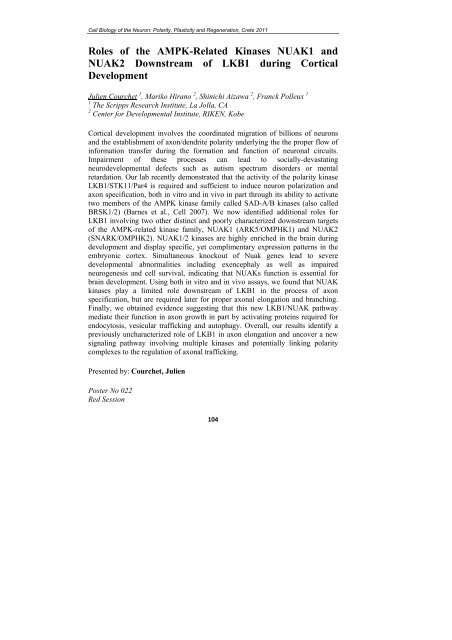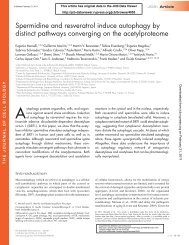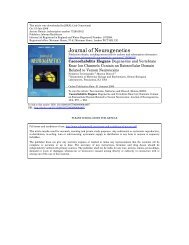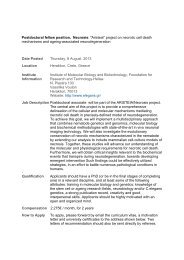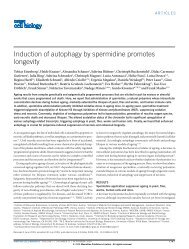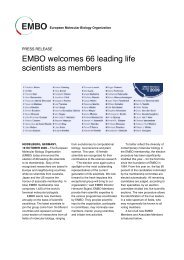CELL BIOLOGY OF THE NEURON Polarity ... - Tavernarakis Lab
CELL BIOLOGY OF THE NEURON Polarity ... - Tavernarakis Lab
CELL BIOLOGY OF THE NEURON Polarity ... - Tavernarakis Lab
Create successful ePaper yourself
Turn your PDF publications into a flip-book with our unique Google optimized e-Paper software.
Cell Biology of the Neuron: <strong>Polarity</strong>, Plasticity and Regeneration, Crete 2011<br />
Roles of the AMPK-Related Kinases NUAK1 and<br />
NUAK2 Downstream of LKB1 during Cortical<br />
Development<br />
Julien Courchet 1 , Mariko Hirano 2 , Shinichi Aizawa 2 , Franck Polleux 1<br />
1 The Scripps Research Institute, La Jolla, CA<br />
2 Center for Developmental Institute, RIKEN, Kobe<br />
Cortical development involves the coordinated migration of billions of neurons<br />
and the establishment of axon/dendrite polarity underlying the the proper flow of<br />
information transfer during the formation and function of neuronal circuits.<br />
Impairment of these processes can lead to socially-devastating<br />
neurodevelopmental defects such as autism spectrum disorders or mental<br />
retardation. Our lab recently demonstrated that the activity of the polarity kinase<br />
LKB1/STK11/Par4 is required and sufficient to induce neuron polarization and<br />
axon specification, both in vitro and in vivo in part through its ability to activate<br />
two members of the AMPK kinase family called SAD-A/B kinases (also called<br />
BRSK1/2) (Barnes et al., Cell 2007). We now identified additional roles for<br />
LKB1 involving two other distinct and poorly characterized downstream targets<br />
of the AMPK-related kinase family, NUAK1 (ARK5/OMPHK1) and NUAK2<br />
(SNARK/OMPHK2). NUAK1/2 kinases are highly enriched in the brain during<br />
development and display specific, yet complimentary expression patterns in the<br />
embryonic cortex. Simultaneous knockout of Nuak genes lead to severe<br />
developmental abnormalities including exencephaly as well as impaired<br />
neurogenesis and cell survival, indicating that NUAKs function is essential for<br />
brain development. Using both in vitro and in vivo assays, we found that NUAK<br />
kinases play a limited role downstream of LKB1 in the process of axon<br />
specification, but are required later for proper axonal elongation and branching.<br />
Finally, we obtained evidence suggesting that this new LKB1/NUAK pathway<br />
mediate their function in axon growth in part by activating proteins required for<br />
endocytosis, vesicular trafficking and autophagy. Overall, our results identify a<br />
previously uncharacterized role of LKB1 in axon elongation and uncover a new<br />
signaling pathway involving multiple kinases and potentially linking polarity<br />
complexes to the regulation of axonal trafficking.<br />
Presented by: Courchet, Julien<br />
Poster No 022<br />
Red Session<br />
104


